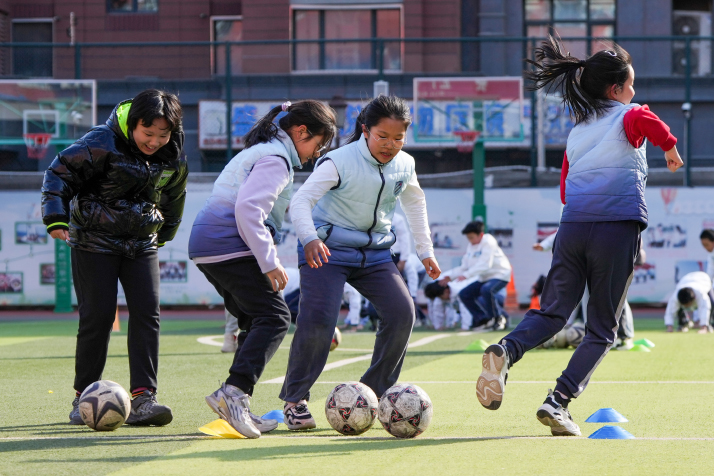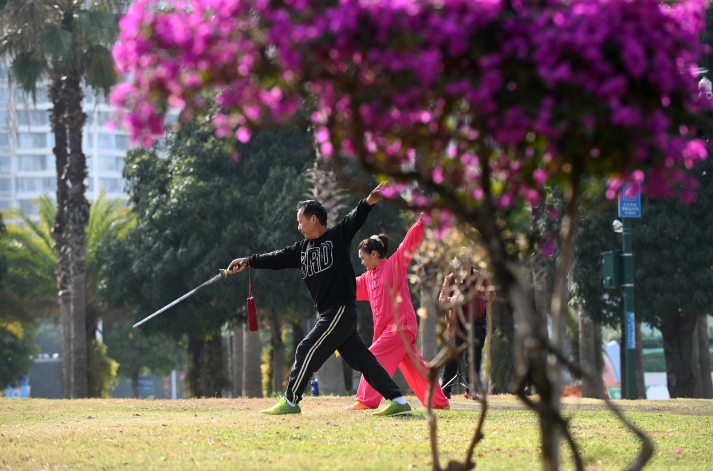| China |
| New national weight management campaign promotes a healthy lifestyle through new measures | |
|
|
 Students play soccer during a physical education class at a primary school in Beijing on February 21 (XINHUA)
Fu Li, a middle school teacher in Changchun, Jilin Province, was relieved to see the country stepping in to assist with weight control. Her father has struggled with heart disease and hypertension due to his unhealthy eating habits. Despite Fu's repeated efforts to persuade him to adopt a healthier diet, he still has not changed.
"My father loves oily, salty dishes and occasionally drinks alcohol, not acknowledging the severe consequences of this lifestyle," Fu shared with Beijing Review. "But when I told him that the Central Government is taking action to help people lose weight and live healthier lives, he became more receptive. It sparked his interest and made him consider what changes he can make. I believe that with the right support, he may finally be motivated to improve his health." The 2025 Report on the Work of the Government, delivered by Premier Li Qiang at the opening meeting of the Third Session of the 14th National People's Congress, the country's top legislature, in Beijing on March 5, reaffirmed China's commitment to a health-first strategy in its medical and health system. At a news conference on March 9, Lei Haichao, head of the National Health Commission (NHC), announced plans to establish more weight management clinics at medical and other health-related facilities, helping people to lose weight safely and pivot to healthier lifestyles. "Some people are struggling with weight management, dealing with expanding waistlines and exceeding healthy weight limits. Some have even developed chronic illnesses, requiring assistance from professional doctors and medical institutions," Lei said, calling for sustained efforts by the government, different sectors of society and individuals. Pay attention! Lei emphasized the launch of a three-year campaign aimed at improving public weight management. In 2024, Chinese authorities, including the NHC and the ministries of education and civil affairs, released a document on the NHC's official website to kickstart this three-year initiative, which advocates for a lifestyle that promotes healthy eating and active participation in physical exercise across society. Specific measures include, among others, strengthening the capabilities of medical and health institutions, disease control agencies and professionals in weight management and health education. "The NHC has enlisted Olympic champions as ambassadors of the weight management campaign and has also developed memes on [China's super app] Weixin to integrate weight management and chronic disease prevention into people's daily lives," Lei said. Following Lei's remarks on the sidelines of the annual gathering of national lawmakers in Beijing, where the year's priorities and goals are set, the hashtag "The country's calling you to drop those pounds" quickly became trending online. Social media platforms like Weibo and Xiaohongshu (RedNote) were flooded with reactions. Some netizens expressed their willingness to participate, while others sought specific advice on how to lose weight.  People hone their martial arts skills at a park in Nanning, Guangxi Zhuang Autonomous Region, on February 4 (XINHUA)
Taking action The 2024 weight management guidelines released by the NHC warn that if the current trend of an increasing number of overweight people is not effectively addressed, by 2030, the rates of overweight and obesity among adults and children in China could reach 70.5 percent and 31.8 percent, respectively. As of now, the obesity rate among Chinese adults is 16.4 percent. Among children under 6 years old, the obesity rate is 3.6 percent, while for children and adolescents aged 6 to 17, it is 7.9 percent. In comparison, in 1982, the obesity rate among children and adolescents aged 7 to 17 was only 0.2 percent, according to the NHC. "Weight management is not a short-term endeavor; it requires establishing healthy habits. It is recommended to pursue weight loss in a scientific manner under professional guidance," Lei Sha, an attending physician in the Department of Endocrinology and Metabolism at Shanghai-based Tongji Hospital of Tongji University, told news portal Cnr.cn. In 2021, Lei's department set up a specialized outpatient clinic for obesity. This clinic conducts standardized assessments for obesity and its related complications, providing personalized treatment and comprehensive management to reduce and maintain weight, thereby promoting overall health improvement. In March, the Medical Weight Management Center was established at the Capital Institute of Pediatrics in Beijing, with the goal of offering professional and comprehensive weight management services for children. "Middle schools are making increasing efforts to help students stay fit and healthy by incorporating the management of students' physical fitness into their health monitoring systems and educational quality evaluations," said Fu, the middle school teacher in Changchun. Moreover, authorities in different regions have committed to supporting the national initiative for weight management and encouraging a healthy lifestyle. For example, Xinjiang Uygur Autonomous Region has set clear goals. Using the average annual increase in overweight and obesity rates from 2019 to 2023 as a baseline, it intends to reduce the average annual increase in overweight and obesity rates among adults and children by 10 percent from the baseline during the 2024-26 period. Official data indicate that the adult population in Xinjiang has an overweight rate of 34.05 percent and an obesity rate of 24.2 percent. Zhejiang Province, where the total overweight and obesity rate has reached 47.6 percent, will support a range of fitness activities. These include different sports contests. Many regions have implemented plans that use "one scale, one measuring tape and one calendar" for weight management. These initiatives encourage families, healthcare institutions, elderly care facilities, schools, government agencies, businesses and hotels to provide weight scales or body composition analyzers. Guangdong Province has launched an initiative to encourage university students to participate in physical exercise at on-campus sports fields. Similarly, Hainan Province has proposed students to "put down their phones, leave their dorms and head to the sports fields" for extracurricular physical activities, emphasizing the importance of managing their body weight. Copyedited by Elsbeth van Paridon Comments to luyan@cicgamericas.com |
|
||||||||||||||||||||||||||||||
|